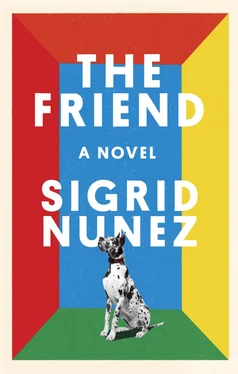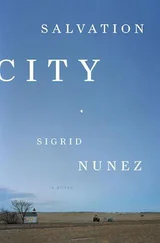Maybe Apollo’s owner had died, and it was whoever then came into possession of him who threw him out.
Most likely we’ll never know where he came from. But here’s what you said. The moment when you looked up and saw him, majestic against the summer sky—that moment was so thrilling and so uncanny that you could almost believe he’d been magicked there. Conjured by a witch, like one of the giant dogs in the Andersen tale.
Part Three
Rather than write about what you know, you told us, write about what you see . Assume that you know very little and that you’ll never know much until you learn how to see. Keep a notebook to record things that you see, for example when you’re out in the street.
I stopped keeping any kind of notebook or journal a long time ago. These days what I seem to see a lot when I’m out in the street is homeless people, or people who look so destitute I assume they’re homeless. It’s not unusual now to see such a person with a cell phone, though. And, unless I’m mistaken, more and more have pets.
On Broadway, at Astor Place, I see a dog all by itself surrounded by belongings: a full backpack, a few paperbacks, a thermos, bedding, an alarm clock , and some styrofoam food containers. It’s the human absence that makes the scene so unbearably poignant.
I see a drunk who’s pissed himself sprawled in a doorway. I Am the Architect of My Own Destiny, his T-shirt says. Nearby, a panhandler with a handmade sign: I used to be somebody.
In a bookstore: a man goes from table to table, laying a hand on this book then that one without examining any one of them further. I follow him for a while, curious to see which book this method tells him to buy. But he leaves the store empty-handed.
Here is something I did not see but would have seen if I’d rounded the street corner just minutes sooner: a person jumping from the window of an office building. By the time I got there the body had been covered up. All I was able to find out later was that it was a woman in her late fifties. Just before noon on a fine fall day, on a densely crowded block. How did she judge it, I wonder, so as not to hit anyone? Or was she just . . . were we all just . . . lucky.
Graffiti on Philosophy Hall: The examined life ain’t worth it either.
• • •
A literary awards ceremony at a private club on the Upper East Side. I emerge from the subway at Fifth Avenue. The club is six blocks away. I see two people who’ve also just come up from the subway: a woman who looks to be in her sixties accompanied by a man about half that age. They could be going any of a million places in that neighborhood, but it occurs to me that they’re headed where I’m headed. Which turns out to be correct. What was it about them? I can’t say. It’s an enigma to me that people in the literary world should be so identifiable. Like the time I passed three men in a booth in a restaurant in Chelsea and pegged them even before I heard one say, That’s the great thing about writing for The New Yorker .
• • •
In the mail, an advance reading copy of a novel and a letter from the editor: I hope you’ll find this debut novel as deceptively profound as I did.
• • •
Lecture notes.
All writers are monsters. Henry de Montherlant.
Writers are always selling somebody out. [Writing] is an aggressive, even a hostile act . . . the tactic of a secret bully. Joan Didion.
Every journalist . . . knows . . . what he does is morally indefensible. Janet Malcolm.
Any writer worth his salt knows that only a small proportion of literature does more than partly compensate people for the damage they have suffered in learning to read. Rebecca West.
There seems to be no remedy for the vice of literature; those afflicted persist in the habit despite the fact that there is no longer any pleasure to be derived from it. W. G. Sebald.
Whenever he saw his books in a store, he felt like he’d gotten away with something, said John Updike.
Who also expressed the opinion that a nice person wouldn’t become a writer.
The problem of self-doubt.
The problem of shame.
The problem of self-loathing.
You once put it like this: When I get so fed up with something I’m writing that I decide to quit, and then, later, I find myself irresistibly drawn back to it, I always think: Like a dog to its vomit .
If someone asks me what I teach, one of my colleagues says, why is it that I can never say “writing” without feeling embarrassed.
• • •
Office hours. The student refers to a certain fact about his life and says, But you already knew that. No, I say, I didn’t. He looks annoyed. What do you mean? Didn’t you read my story? I explain that I never automatically assume a work of fiction is autobiographical. When I ask him why he thinks I should have known that he was writing about himself, he looks puzzled and says, Who else would I be writing about?
• • •
A friend of mine who is working on a memoir says, I hate the idea of writing as some kind of catharsis, because it seems like that can’t possibly produce a good book.
• • •
You cannot hope to console yourself for your grief by writing, warns Natalia Ginzburg.
Turn then to Isak Dinesen, who believed that you could make any sorrow bearable by putting it into a story or telling a story about it.
• • •
I suppose that I did for myself what psychoanalysts do for their patients. I expressed some very long felt and deeply felt emotion. And in expressing it I explained it and then laid it to rest. Woolf is talking about writing about her mother, thoughts of whom had obsessed her between the ages of thirteen (her age when her mother died) and forty-four, when, in a great, apparently involuntary rush , she wrote To the Lighthouse . After which the obsession ceased: I no longer hear her voice; I do not see her.
Q. Does the effectiveness of catharsis depend on the quality of the writing? And if a person finds catharsis by writing a book, does it matter whether or not the book is any good?
My friend is also writing about her mother.
Writers love quoting Milosz: When a writer is born into a family, the family is finished.
After I put my mother in a novel she never forgave me.
Rather than, say, Toni Morrison, who called basing a character on a real person an infringement of copyright . A person owns his life, she says. It’s not for another to use it for fiction.
• • •
In a book I am reading the author talks about word people versus fist people. As if words could not also be fists. Aren’t often fists.
• • •
A major theme in the work of Christa Wolf is the fear that writing about someone is a way of killing that person. Transforming someone’s life into a story is like turning that person into a pillar of salt. In an autobiographical novel, she describes a recurring childhood dream in which she kills mother and father by writing about them. The shame of being a writer haunted her all her life.
• • •
I wonder how many psychoanalysts actually do for their patients what Woolf did for herself. I bet not many.
• • •
They can debunk Freud’s ideas all they want, you said. But no one can say the man wasn’t a great writer.
Was Freud even a real person? I once heard a student ask.
It was a psychoanalyst, of course, who came up with the term writer’s block . Edmund Bergler was, like Freud, an Austrian Jew, and he was a follower of Freudian theory. According to Wikipedia, he believed that masochism was the root cause of all other human neuroses, that the only thing worse than man’s inhumanity to man was man’s inhumanity to himself.
Читать дальше












